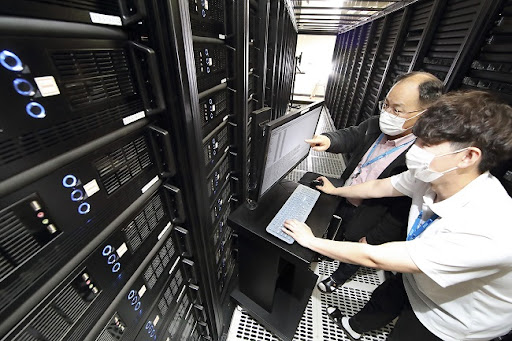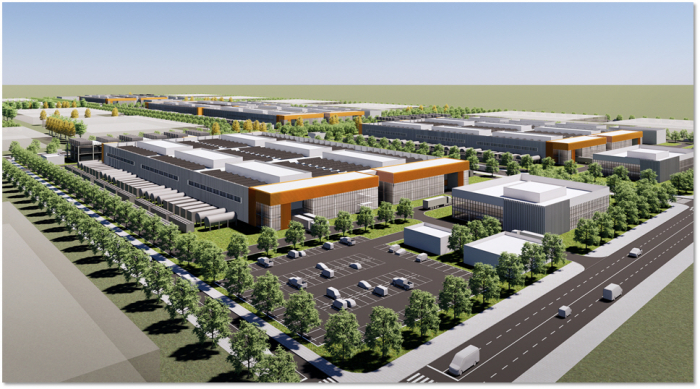South Korea’s data center industry is experiencing significant growth, driven by the increasing demand for digital services and advanced technologies. The market is projected to expand from 1.11 thousand MW in 2024 to 2.02 thousand MW by 2029, reflecting a compound annual growth rate (CAGR) of 12.73%.
This expansion presents numerous opportunities for businesses seeking reliable and efficient data storage and processing solutions within the country.
In this article of Danacloud, we explore the dynamic landscape of South Korea’s data center market, highlighting key opportunities for investment and growth. We also provide a curated list of top domestic data centers, offering insights into their services and capabilities. Whether you’re a business looking to expand your digital infrastructure or an investor seeking to capitalize on this booming sector, our comprehensive guide will help you navigate the opportunities and make informed decisions.
Read on to discover the leading data centers in South Korea and how they can support your business needs.
Here’s a table summarizing the Domestic Data Center Landscape in South Korea:
| Category | Details |
|---|---|
| Market Growth | South Korea’s data center market is projected to grow from 1.11 thousand MW in 2024 to 2.02 thousand MW by 2029, with a CAGR of 12.73%. |
| Key Drivers of Growth | – Regulatory Compliance (PIPA) – Demand for Edge Computing (e.g., gaming, e-commerce, AI) – Government Investment (Korean New Deal) – Sustainability Goals |
| Key Features of Domestic Data Centers | – Local Data Sovereignty: Compliance with local regulations like the Personal Information Protection Act (PIPA) – Reduced Latency: Proximity to end users – Localized Support: Native language services for local businesses |
| Top Domestic Data Center Locations | 1. Seoul Metropolitan Area: Major businesses and financial institutions, high demand for data services 2. Incheon: Proximity to Seoul and international airport 3. Pangyo Techno Valley: Korea’s tech hub 4. Busan: Coastal location with international connectivity 5. Gwangju & Daejeon: Emerging regions for IT infrastructure development |
| Top Domestic Data Centers | – SK C&C: Energy-efficient, cloud services, large-scale operations – KT Corporation: Disaster recovery, network infrastructure – LG Uplus: Low-latency services, cloud-based solutions |
| Domestic Data Center Ranking | 1. SK C&C: Leading in energy efficiency, large-scale services 2. KT Corporation: Reliable, disaster recovery 3. LG Uplus: Low-latency and energy-efficient solutions 4. Hyosung ITX: High-density storage, 24/7 support |
| Key Companies Behind Data Centers | – SK C&C: Large-scale cloud infrastructure – KT Corporation: Telecommunication & cloud services – LG Uplus: Energy-efficient and scalable solutions – Hyosung ITX: Secure, high-density data centers – Samsung SDS: AI and big data analytics |
| Emerging Data Center Locations | Pangyo Techno Valley: Known as Korea’s “Silicon Valley” Busan: International connectivity via undersea cables Gwangju & Daejeon: Decentralizing data centers from Seoul |
| Number of Domestic Data Centers | Over 100 domestic data centers, with the majority located in Seoul, Incheon, and metropolitan areas like Gyeonggi-do. Pangyo and Busan are emerging hubs. |
| Domestic Data Center Map | Concentration in the Seoul Metropolitan Area, with growing infrastructure in Busan, Pangyo, Gwangju, and Daejeon to ensure optimal access and low latency. |
Domestic Data Center
A domestic data center refers to a facility established and operated within a specific country to store, manage, and process data locally. These centers cater to national businesses, government agencies, and users, ensuring compliance with local regulations and providing region-specific benefits.
Read more: What Is Data Center Networking?
Key Features of Domestic Data Centers:
- Local Data Sovereignty: Data is stored and processed within the country, aligning with regulations like South Korea’s Personal Information Protection Act (PIPA).
- Reduced Latency: Proximity to end users ensures faster data access and better performance.
- Localized Support: Services are tailored to local businesses, with customer support in the native language.
Domestic Data Center Status
South Korea’s tech-forward economy has led to a surge in domestic data centers. Factors driving this growth include:
- Regulatory Compliance: Strict privacy laws demand local data storage.
- Demand for Edge Computing: Industries like gaming, e-commerce, and AI benefit from low-latency solutions.
- Government Investment: Initiatives like the Korean New Deal include significant investments in digital infrastructure, promoting domestic data center expansion.
- Sustainability Goals: Korean data centers are adopting green technologies, aligning with the country’s commitment to carbon neutrality by 2050.
Domestic data centers in Korea are critical to supporting the nation’s digital transformation while addressing security, efficiency, and environmental concerns.
Domestic Data Center Location
South Korea’s data centers are strategically located in areas that optimize infrastructure, connectivity, and environmental factors. Here are the key locations and their importance:
1. Seoul Metropolitan Area
-
Why It’s Important:
- Home to South Korea’s largest businesses and financial institutions, requiring robust data infrastructure.
- Dense population creates high demand for low-latency data services.
- Excellent connectivity with major ISPs and high-speed networks.
2. Incheon
-
Why It’s Important:
- Close to the Seoul metropolitan area but with more available land and lower operational costs.
- Proximity to Incheon International Airport ensures global connectivity.
- A growing hub for green data centers utilizing renewable energy sources.
3. Pangyo Techno Valley (Seongnam)
-
Why It’s Important:
- Known as Korea’s “Silicon Valley,” it houses tech giants and startups.
- Ideal for edge computing due to its proximity to tech ecosystems.
4. Busan
-
Why It’s Important:
- Strategic coastal location ensures access to undersea cable networks, critical for international data traffic.
- Lower risk of earthquakes compared to other regions, making it a stable choice for data center construction.
5. Gwangju and Daejeon
-
Why It’s Important:
- Emerging as secondary data center hubs to decentralize operations from Seoul.
- Lower land costs and growing government support for regional IT infrastructure.
Each location plays a vital role in supporting South Korea’s digital economy, ensuring robust data storage, processing, and connectivity tailored to national and global needs.
Domestic Data Center Ranking
South Korea’s data center market is highly competitive, with several key players dominating the landscape. Here’s a ranking of the top domestic data centers, based on their scale, reliability, technological advancements, and market influence:
1. SK C&C
-
Why Ranked #1:
- SK C&C leads the market with its large-scale, secure, and environmentally sustainable data centers.
- Known for cutting-edge facilities and strong focus on energy efficiency, it provides high availability and scalability for businesses.
- Offers nationwide coverage and a strong reputation in cloud services and IT infrastructure.
2. KT Corporation
-
Why Ranked #2:
- KT’s data centers are recognized for their reliability and excellent disaster recovery systems.
- The company provides comprehensive services, including cloud solutions and advanced network infrastructures, to large enterprises and government organizations.
- It operates in key locations like Seoul and Busan, ensuring both domestic and international connectivity.
3. LG Uplus
-
Why Ranked #3:
- LG Uplus offers highly secure, scalable data centers with a strong emphasis on low-latency cloud services.
- Known for its innovations in cloud-based solutions, LG Uplus has made significant strides in providing affordable and efficient services.
- Its energy-efficient technologies have made it a preferred choice for businesses looking for sustainable data storage.
4. Hyosung ITX
-
Why Ranked #4:
- Hyosung ITX is known for its robust, high-density data centers, which offer 24/7 support and secure cloud storage.
- Although smaller in scale than the top three, it provides tailored services with high availability and data protection features for businesses across various sectors.
These rankings are based on technological innovation, market leadership, infrastructure quality, and customer satisfaction, positioning these companies as the leading domestic data center providers in South Korea.
Domestic Data Center List
| Rank | Data Center Name | Location | Key Features |
| 1 | SK C&C | Seoul | Energy-efficient, large-scale operations, cloud services |
| 2 | KT Corporation | Seoul, Busan | Disaster recovery, network infrastructure, cloud solutions |
| 3 | LG Uplus | Seoul | Low-latency services, cloud-based solutions, energy efficiency |
| 4 | Hyosung ITX | Seoul | High-density storage, secure cloud services, 24/7 support |
| 5 | Samsung SDS | Seoul | Advanced AI solutions, big data analytics, secure facilities |
| 6 | CJ Olive Networks | Seoul | Cloud services, high-security operations, edge computing |
| 7 | Naver Business Platform | Seongnam | Data storage, high availability, AI-powered data management |
| 8 | Kakao IX | Seoul | Cloud computing, energy-efficient, secure data storage |
| 9 | Hanwha Systems | Seoul | Cloud services, secure data centers, green energy use |
| 10 | Duzon Bizon | Seoul | IT infrastructure, cloud services, disaster recovery |
| 11 | LS Networks | Incheon | Network infrastructure, scalable data storage, low-latency |
| 12 | Daewoo Engineering & Construction | Seoul | Data management, security, AI integration |
| 13 | NHN Global | Seoul | Cloud computing, data protection, global connectivity |
| 14 | SK Networks | Seoul | High-performance computing, big data services |
| 15 | KT Cloud | Seoul | Cloud infrastructure, data analytics, scalable solutions |
Number of Domestic Data Centers
South Korea has over 100 domestic data centers, with the majority located in Seoul, Incheon, and the surrounding metropolitan areas. These locations offer optimal connectivity and infrastructure for both domestic and international clients. Key areas like Pangyo Techno Valley and Busan are also emerging as important hubs. Major companies that utilize these data centers include tech giants like Samsung, LG, and SK, along with cloud service providers like KT Corporation and LG Uplus. These data centers serve industries ranging from telecommunications to finance, e-commerce, and AI research, ensuring seamless, high-performance services.
Domestic Data Center Distribution Map
As we said before, the Domestic Data Center Distribution Map of South Korea shows a concentration of data centers in the Seoul Metropolitan Area (including Incheon and Gyeonggi-do) due to its high population density, business hubs, and advanced infrastructure. Other notable locations include Pangyo Techno Valley for tech-focused data centers, Busan for international connectivity with undersea cables, and emerging areas like Daejeon and Gwangju for expanding regional data center networks. This distribution ensures optimal access, low latency, and reliable services for both domestic and global clients.
Domestic Data Center Companies
Key companies behind South Korea’s domestic data centers include SK C&C, KT Corporation, LG Uplus, Hyosung ITX, Samsung SDS, Naver Business Platform, Kakao IX, Daewoo Engineering & Construction, and NHN Global. These companies provide a range of services, from cloud solutions to high-performance computing and secure data storage.
Final Thoughts
South Korea’s domestic data center industry is a cornerstone of its digital infrastructure, supporting everything from cloud computing to big data services. With a growing demand for secure, efficient, and scalable solutions, companies like SK C&C, KT, and LG Uplus are leading the way. As technology evolves, these data centers will continue to play a critical role in shaping the nation’s digital economy.


